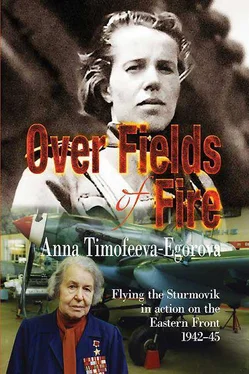Only the day after, towards evening, did I find the village of Shali, beyond Grozny, and appear before the squadron commander. “I crashed my plane and am ready to bear responsibility for it according to the war time rules” I rattled off, standing at attention.
Major Boulkin, it seemed to me, was in a bad mood. Looking at me angrily he began to yell, “Do you wanna go to a penal company? You’ll find out there what hard times are! Now look — they’ve started playing vandal to escape to combat aviation!”
Whom Major Boulkin had in mind I didn’t know, but it hurt to listen to his abuse.
Alexey Ryabov stood up for me. “Look, Commander, let’s transfer her to the UTAP 94 94 Translator’s note — Air Force Training Regiment.
together with Potanin. Let her be retrained. After all, there’ve already been five requests to send her off to a women’s regiment…”
This was the first time I had heard about that, but I didn’t have a chance to say anything — Dronov appeared from nowhere: “Permission to speak? I’ll fix up Egorova’s plane. I promise!”
Many years later I found out Dronov had indeed restored my plane and handed it over to the squadron engineer, but then secured for himself a transfer to another unit and worked as a mechanic on an La-5 fighter plane till the end of the war. Nevertheless, Potanin and I were transferred to the town of Salyany on the Caspian sea to a training regiment. And the first obstacle on my way to a combat plane appeared immediately.
“So, a ground-attack pilot?” The Regimental Commander said with interest. “But do you know what a hellish job it is to attack ground targets? No woman has fought in a Sturmovik yet! Two cannons, two machine-guns, two batteries of rockets, various bombs — that’s the Il’s 95 95 Translator’s note — Ilyushin Il-2.
armament. Trust my experience — not every good pilot can handle such a machine! Not everyone is capable steering a ‘flying tank’, of orienting himself in combat conditions while hedge-hopping, bombing, shooting the cannons and machine-guns, launching rockets at rapidly flashing targets, conducting group dog-fights, sending and receiving orders by radio — all at the same time. Think it over!” he reasoned with me.
“I’ve though it over already. I understand everything” I replied briefly but resolutely.
“God save us, what a stubborn one! Then do what makes sense to you!” And the Regimental Commander backed down.
I lived there in a two-room flat with the wife of one of the pilots, who had flown to there from Baku. There were plenty of planes in the training regiment but all of them were obsolete. We flew UT-2, UTI-4, SB, I-16, Su-2. You could choose any plane and I flew a lot in an I-16. People said the I-16 was a very difficult plane to handle but I had no problems — that made the guys envious. It was such a small, wonderful plane, so agile! But of the Il-2 Sturmovik , which the regiment commander had commented would be beyond my control, there was still no sign. Still, my new comrades and I were eager to master that very Sturmovik . Nevertheless, I enthusiastically set about studying the equipment that was new to me. I learned to handle a fighter plane and to conduct a ‘dog-fight’. I could confidently take off in a light Su-2 bomber. Finding that its take-off and landing speed were almost the same as the Il-2’s, I took to this plane with a special zeal. Its engine worked on castorka , that is, castor oil. They would say then: “The castorka has arrived, hold onto your guts!” 96 96 Translator’s note — referring to the use of castor oil as a laxative.
Training flights were undertaken almost daily. I remember we started a dog-fight there, I began to loop my I-16, then landed and began to climb out, my head spun and I fainted: I was hungry. Petrol was plentiful in the regiment — fly as you please, but the food in the dry mess was watery, to put it mildly. We had cash, for we were paid wages, but there was nothing to buy — everything was rationed. The guys would go to the Kura river to fish for lamprey and call me to go with them. These lampreys were like snakes and that was why I thought: “My God, I’d rather stay hungry!” But having fainted after the fighting drill in that Ishak 97 97 Translator’s note — a nickname for I-16, originating from the Russian pronunciation of I-shestnadtsat (I-16), literally, ‘a donkey’.
I told them; “Guys, I’m coming with you and I’ll eat lampreys”. They would set up a campfire, fry them a bit and eat them.
Once I heard that the head of the political section of the 230th Ground Attack Aviation Division Colonel Toupanov had arrived at the UTAP to select pilots for combat regiments. Well, I thought “You can’t die twice, but we’ll all die once” and rushed to headquarters! I asked everyone I met: “Where’s Toupanov?” But they only shrugged in reply. At last I stopped a stumpy man in flying overalls and uniform peaked cap and asked again: “Do you know where Colonel Toupanov from the front is around here?”
The stranger looked at me attentively, smoothing out the wrinkles on his overalls under his officer’s belt. “And what exactly do you need him for?”
“I’ll tell as soon as I meet him”
“Let’s assume I’m Toupanov.”
“You?” My insolent tone frightened me. What a blunder I’d committed! But there was no room to retreat. And furthermore the colonel repeated: “So, what did you want to tell me?”
“My name is Egorova,” I started from the beginning. “I graduated from the Kherson aviation school, worked as a pilot-instructor, have been at the front since the beginning of the war as a pilot in Boulkin’s squadron, maybe you’ve heard of it…”
“Can you make it shorter?”
“I can… Take me into your division!”
Obviously the colonel had not expected such a turn of events. He looked at me narrowly once again: was I joking or not?… But there was no sign of levity on my face. “Alright, Egorova. Come around tomorrow for an interview…”
In the morning about thirty men were gathered by the headquarters. Among the agitated crowd of pilots there were invitees and volunteers. Everyone wanted to fly the Sturmoviks — such was the mood! Toupanov spoke to every man — questioned them about flying, home, family. Some were picked for the 230th Ground Attack Aviation Division, some were not. When it was my turn and I entered the office, Toupanov, not responding to my salutation, kept silent and at last said, “Do you understand what you’re asking? To fight in a ‘flying tank’! Two cannons, two machine-guns, rockets! And hedge-hopping height? Diving? Not all men can handle that…”
“I understand,” I replied quietly. “Of course the Il-2 is not a ladies’ plane. But is the U-2? Dying is not ladies’ business either! It’s not the time for bearing children!” Here I got heated. “But I’m not a countess, I’m a Metrostroy girl. My hands are no weaker than a man’s…” And I stretched both hands forward. But the Colonel wasn’t looking at them at all. Only now had he noticed the Order of the Red Banner on my chest.
“What were you decorated for?”
“For locating the Cavalry Corps and carrying out other missions for the Southern Front HQ”, I replied.
“W-e-l-l,” Toupanov drawled. “In the first year of the war they didn’t give many of those…” And he continued, “It seems to me you said you used to work as a pilot-instructor before the war?”
“I did, in the Kalinin aeroclub.”
“And how many people did you teach to fly?”
“Forty two…”
Toupanov remained silent, and then began to ask about my mother, then about my brothers. Of my brothers I said they were all at the front, but concealed again that my eldest brother had been repressed. I told him about my sister Zena as well — she was in the sieged Leningrad working as foreman at the Metal Plant.
Читать дальше












